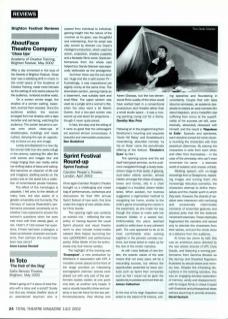Once again Camden People's Theatre brought us a challenging and mixed bag of performances, workshops and discussions for their fifth annual Sprint festival of new work, this time under the reigns of new artistic director Chris Goode.
The opening night was certainly an eclectic mix – reflecting the new policy of moving beyond the usual Sprint physical and visual theatre remit to also include mixed-media cabaret (Bob Karper launching the new cptDOODAH!) and performance poetry (Mike Weller of the for-enthusiasts-only Sub Voicive variety).
The highlight of the evening was Scapegoat, a new production by Wishbone in association with CPT. A movable screen placed at the front of the stage provided an interesting scenographic premise: scenes were played out with only part of the performers bodies visible; at one point only feet, at another only heads. It was a visually beautiful show and certainly a tour-de-force for the two performers/devisers, Paul Murray and Karen Glossop, but the two-dimensional filmic quality of the show would have worked best in a conventional proscenium arch theatre rather than a small studio space – it was a moving painting crying out for a frame.
Dorothy Max Prior
Following on in the programming from Wireframe's haunting and exquisite North Hill Relay and Scrabblecat's meandering, absurdist comedy La Vie en Rose came the penultimate offering of the festival, Einstein's Eyes by Not I.
The opening scene and the set itself held great promise, as the audience navigated through a dusty book-strewn stage to their seats. A greying, dust-laden elderly woman, almost hidden amongst the chaos of papers, boxes and tomes, sits in a chair engaged in a troubled, dream-ridden sleep. When awoken, her routines suggested a regimented method to navigating her home, similar to the child's game of avoiding the cracks in the pavement, as she made her way though the chaos to make safe her treasure hidden in a sealed box. Unfortunately the piece seemed unable to settle down to any coherent path. The cast appeared to be at its most comfortable when working together in the periodic comedy routines, but these failed to make up for the rest of the erratic narrative.
As with many festivals of new theatre, the eclectic nature of the work means that not every piece will be a resounding success, but without the opportunities presented by brave ventures such as Sprint then companies such as Not I would not be given the opportunity to practise and hone their art.
James Callachan
At the end of his reign Napoleon was exiled to the island of St Helena, writing speeches and floundering in uncertainty. Couple that with tales about an amnesiac, an academic desperate to restore an early twenties film about Napoleon, and a model film star suffering from ennui at the superficiality of his success yet still, paradoxically, absolutely obsessed with himself, and the result is Napoleon in Exile. Episodic and splintered, each storyline turned full circle, cleverly reuniting the characters with their perpetual dilemmas. By placing the characters in exile from each other, and often from themselves – in the case of the amnesiac who can't even remember his name – a dramatic world of isolation and unease unfolds.
Melding speech with on-stage recordings from a Dictaphone, repeating images and turning them into increasingly ridiculous scenarios, the characters attempt to define themselves and the chaotic world in which they exist. However, the strands of narrative were interwoven with confusing and occasionally interminable moments of ensemble gestures and physical jerks that felt like textbook movement exercises. These interludes fragmented the narrative and served only to alienate the characters from their stories, and put the whole show at a distance from the audience.
At times too clever by half, this was an ambitious piece directed by the new artistic director of CPT, Chris Goode, and featuring a winning performance from Gemma Brockis as the stumpy and thwarted Napoleon frustrated by sexual desire and memory loss. Despite the infuriating disruptions in the twisting narrative, this was an engaging devised exploration of memory, vanity and displacement: with its tongue firmly in cheek it toyed with theatrical and philosophical ideas without assuming to provide answers.
David Gurlach

